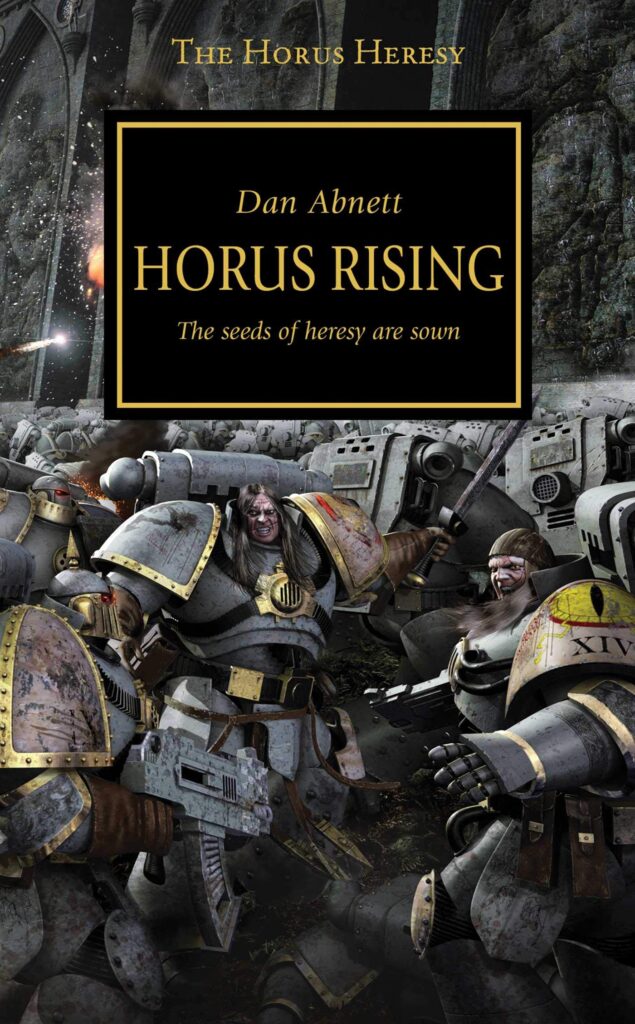Horus rising
Why You Should Read… Horus Rising
Hello all, Carl here with another book review, this time focusing on the first novel of the epic Horus Heresy series entitled Horus Rising and written by Dan Abnett, who once again has done a sterling job in setting the stage for an ongoing novel series.

Brief Overview
Horus Rising sets the stage for the ending of the Great Crusade, the period in Warhammer 40,000 history where mankind was at its peak, setting out across the galaxy to conquer and reunite the shattered fragments of humanity under the banner of the mysterious Emperor of Mankind and his Imperium, a far less totalitarian, secular incarnation of the Imperium that many of us will know from Warhammer 40,000. We see the unfolding narrative from a multitude of perspectives, from mortal members of the crew of the 63rd expeditionary fleet, to Garviel Loken, a Space Marine captain and part the Warmaster Horus’ inner circle, to the architect of the Horus Heresy himself, Horus Lupercal. We witness several campaigns of the Luna Wolves legion and see the heights of glory achieved by these mighty warriors before they begin their fall into darkness that all followers of the main Warhammer 40,000 narrative will no doubt be acutely aware of. (After all, the series isn’t called the Horus Heresy for nothing!)
Why I Like It
There are several reasons I have a particular fondness for this novel. As mentioned as one of the main reasons I enjoyed Eisenhorn: Xenos in my previous review, Dan Abnett does a fantastic job in setting the scene and framework for an ongoing narrative of epic proportions from a variety of viewpoints to really give a solid foundation for later novels to build upon, giving us several interesting perspectives and characters to become invested with. The character of Garviel Loken in particular is compelling, due to his role as a captain in the Luna Wolves legion and the fact that unlike later Space Marines, while he is a superhuman soldier, he isn’t hyper-indoctrinated and unquestioning. A particularly enjoyable subplot narrates to this, where he turns to his human mentor, Kyril Sinderman, for spiritual and moral guidance as he is confronted with various forces that question his simple view of the galaxy as a soldier and force him to confront the fact that everything is not as black and white as the secular Imperial Truth would have us believe.
There are moments that provide us insight into the mind of Horus himself, too. How he struggles to deal with the burden of leadership of the Great Crusade that his father has entrusted him with. We see how not all of his 17 Primarch brothers have complete faith or trust in him, and he within them in turn. We also see how he, as a figure almost regarded as a demigod by those who encounter him, struggles with more human issues such as a sense of abandonment by his father and isolation as, aside from his brothers, no-one else knows quite what it is like to be what he is and, since his elevation, no-one is able to relate to him completely.
Finally, we also see events unfold from the perspectives of the Remembrancers, normal humans attached to the Great Crusade’s fleets that are to immortalize the events in the forms of documentation and artistic expression, who all have their own insights and opinions on the Space Marines, the crusade itself, the Emperor, and Horus, as well as the nascent beginnings of the Emperor-worshiping religion that fans of Warhammer 40,000 setting will be all too familiar with.
The novel is also punctuated with well-written action scenes, serving to depict the might and superiority of the Space Marine legions to any other known force in the setting and even teases us with future events in the form of asking ‘What force could ever truly defeat the Space Marines, save for the Space Marines themselves’, more apt foreshadowing. The action scenes are visceral, detailed and really draw you in to the moment without dwelling too far into the sake of violence for the sake of violence, the action sequences helping to add to and provide important moments to the plot rather than just bulking out the novel as some Black Library novels are sometimes prone to.
Summary
In summary, the novel does an excellent job in setting the stage for the Horus Heresy series series and providing a multitude of different viewpoints for the events about to unfold. The contrast in perspectives and human concerns causes you to grow invested in the various characters present, with notable appearances from characters that Warhammer 40,000 players will be familiar with, such as Abaddon (The Despoiler) and Lucius (The Eternal) of Chaos Space Marine fame, which serves to tie this ‘historical’ novel to the current day setting of Warhammer 40,000. I would thoroughly recommend reading Horus Rising as an excellent novel in its own right, though would give a friendly warning that it is likely to draw you in to read the epic, 50+ novel series that is the Horus Heresy! Horus Rising does an excellent job at telling a Space Marine-based tale without having it seem repetitive, always providing fresh ideas, personalities and viewpoints that make it certainly very different compared to ‘modern’ Warhammer 40,000 novels, in what I feel is a good way.
